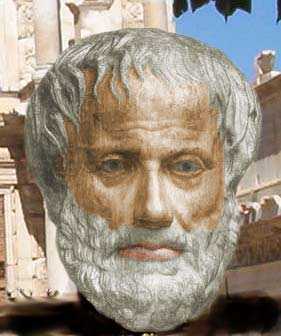Aristotle/On the Soul: discussion group

by Kolja Mendler
Welcome to the Discussion group for On the Soul by Aristotle.
Content summary
Panpsychism is still a popular world view among people who have not taken a skeptical approach to the idea that all living organisms have a common feature: mind. Aristotle studied many types of living things and observed that they display different types of sensory and cognitive abilities. Aristotle noted that both plants and animals obtain what they need for growth and reproduction but only animals have a sense of touch, the simplest kind of perception. Aristotle was concerned with making the distinction between those animals that can feel pleasure and pain and those that cannot. Some animals have complex abilities for memory and the control of their behavior. In the case of humans, our memories allow us to produce rational thought processes and have what we experience as a mind.
Goals
This learning project offers learning activities to explore the classical Greek understanding of the mind.
Concepts to learn include: how modern concepts of the mind arose from earlier ideas.
Learning materials
Learning materials and learning projects are located in the main Wikiversity namespace. Simply make a link to the name of the lesson (lessons are independent pages in the main namespace) and start writing!
You should also read about the Wikiversity:Learning model. Lessons should center on learning activities for Wikiversity participants. Learning materials and learning projects can be used by multiple projects. Cooperate with other departments that use the same learning resource.
- On the Soul: Outline Outline of the work studied.
- Vitalism. Was Aristotle a vitalist?
- ...
Texts
- The book "De Anima: On the Soul" by Hugh Lawson-Tancred (ISBN 0140444718) has a useful introduction and can be found in book stores.
- Consciousness Studies/Early ideas - at Wikibooks
- ...
Activities
- read the book (see the previous section of this page)
- discuss the book (see the next section of this page)
- etc.
Discussion
Did Aristotle use the word "soul"? Why do some translators translate "De Anima" as "On the Soul"?
(Greek - Peri Psyche, Latin - De Anima, English - all of the following have been suggested for translations of "psyche": "soul," "spirit," "principle of life," and "mind"). "Psyche", "Thumos", and "Pneuma" are all terms that may be translated as "soul" in different authors and contexts. However, the Greek "psyche," the Latin "anima" and the English "soul" have always been regarded as cognates; likewise for "pneuma," "spiritus," and "spirit". In Aristotle, "Psyche" is not well translated as "mind". This is so for two reasons. It is neither identical with the brain nor the thing that thinks ("Nous" is translated as "Mind" in this latter sense). The soul is either the structure or the thing that provides structure to the living thing.
What are the main topics for the three parts of "De Anima"?
Did Aristotle have a modern conceptualization of the human mind? What passages from his book support your view?
Additional Readings
- Wikipedia article: On the Soul
- Aristotle's biology - Stanford encyclopedia of philosophy.
- Aristotle's Biology: Recommended Readings - Cynthia Freeland
- Daniel Dennett's book "Kinds of Minds", Chapter 2. Dennett desribes Aristotle's "nutritive soul" as a principle of organization by which living organisms respond to their environment so as to self-regulate and self-protect. How does Dennett's efforts to understand mind within the frame of biological evolution go beyond what was possible for the ancient Greeks?
- The biochemist Albert L. Lehninger wrote about the "molecular logic of the living state". Is it possible to provide a coherent study of life and mind without any knowledge of the molecular basis of living organisms?
- etc.
References
Additional helpful readings include other Wikiversity pages found at: Category:Philosophy of Mind
Active participants
Active participants in this Learning Group
- ...
Learning Project Summary
- Project code:
- Suggested Prerequisites:
- ...
- Time investment:
- Assessment suggestions:
- Portal: Humanities
- School: School of Philosophy
- Department: Classical Philosophy of Mind
- Stream
- Level: